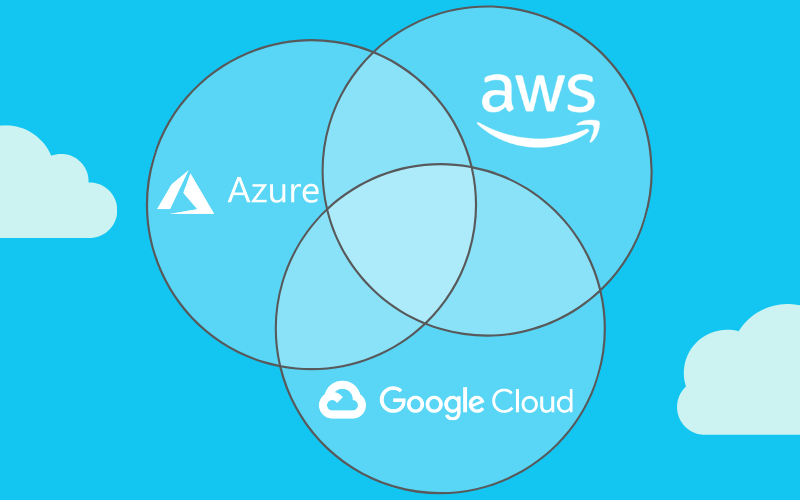The most characterizing cloud battle is between AWS, Azure, and Google. Picking one public cloud from AWS, Azure or Google is the most troublesome task for the person who needs to enter and develop in the cloud world. This blog will enable you to settle on the correct choice!
With the developing significance of Cloud Computing, public cloud services are these days in enormous interest. This expanding interest for public cloud is, therefore, opening the entryways of more development and open doors for cloud specialist organizations. So as to grow strong in this field, cloud organizations are engaged to build their services while diminishing costs to lead in the market of the public cloud.
As indicated by Gartner Survey Report, the market for public cloud is anticipated to reach from $260 billion out of 2017 to around $411 billion in the year 2020.
AWS, Google, and Azure are the cloud services that depend on their cloud computing model where the cloud specialist provider supply assets like database, applications, and storage over the web.
The most well-known cloud computing platforms are Amazon Web Services (AWS), Microsoft Azure, and relative newcomer, Google Cloud Platform (GCP). When looking at services from every one of these platforms, it’s imperative to think about the size and objectives of your organization, your normal development rate, and your spending limit.
Be that as it may, not all business cloud platforms are the equivalent. They offer various highlights, and some are increasingly perfect with explicit plans of action and company sizes.
AWS vs. Azure vs. Google Cloud; Features Comparison
AWS vs. Azure vs. Google: Market Share
AWS: Since its origin, AWS has been the predominant cloud supplier of the overall industry in terms of market share, and 2018 was no exemption. As indicated by Amazon’s quarterly deals results, AWS saw $25.7 billion in income in 2018, the most elevated among all cloud suppliers. It likewise flaunted a 47% yearly development.
This isn’t astounding considering AWS had a seven-year head start before Microsoft and Google entered the public cloud space. Subsequently, AWS services are by a long shot the most advanced.
Azure: In their 2018 yearly report, Microsoft announced $23.2 billion in business cloud income, a worth that pools together the income of a few cloud properties — Azure being one of them. That number is misdirecting, however. It might appear as though Azure is inside reached of passing AWS in income. Yet, Azure’s income is packaged with Office 365 on its 10-K budgetary report, so this may not be the situation.
Examiners gauge real Azure income at around $13.5 billion out of 2018, which speaks to a fantastic 82% yearly development. Nonetheless, Azure is still essentially behind AWS when it comes to market share at 13.7%. Be that as it may, even with the uncommon contrast, Azure still verifies the second spot for a most noteworthy piece of the pie among cloud suppliers.
GCP: Google hasn’t revealed its cloud income for 2018, yet, however Canalys assessments Google’s cloud income at $6.8 billion, speaking to yearly development of 94%. That verifies Google’s spot for the third most noteworthy piece of the pie.
Compute, storage, databases, and networking
For process, AWS’s principle offering is its EC2 examples, which can be custom-made with countless choices. It likewise gives related services, for example, Elastic Beanstalk for application deployment, the EC2 Container Service, AWS Lambda, and Autoscaling.
Then, Azure’s computing service is based on its Virtual Machines (VMs), with different instruments, for example, Cloud Services and Resource Manager to help send applications on the cloud, and it’s Azure Autoscaling service. Know more about Azure windows virtual desktop and Azure Migration Services.
Google’s adaptable Compute Engine conveys VMs in Google’s server farms. They rush for sure, accompany tireless disk storage, guarantee predictable execution and are exceptionally customizable relying upon the requirements of the client.
Each of the three cloud suppliers bolsters relational databases – that is Azure SQL Database, Amazon Relational Database Service, Redshift and Google Cloud SQL – just as NoSQL databases with Azure DocumentDB, Amazon DynamoDB, and Google Bigtable.
Pricing
Pricing can be a colossal fascination for those thinking about a transition to the cloud, and all things considered: there has been a descending pattern on costs for quite a while as the huge suppliers compete.
By and large terms, costs are generally equivalent, particularly since AWS moved from by-the-hour to by-the-second valuing for its EC2 and EBS benefits in the Autumn of 2017, carrying it into line with Azure and Google.
Be that as it may, making an unmistakable correlation can be intense as each of the three offers marginally extraordinary valuing models, limits and make incessant value cuts.
Numerous specialists prescribe that enterprises assess their public cloud needs on a case-by-case premise and match explicit applications and remaining tasks at hand with the seller that offers the best fit for their needs. Every one of the main merchants has specific qualities and shortcomings that settle on them a decent decision for specific tasks.
Some More Pros and Cons
Both AWS versus Azure versus Google Cloud are predominant choices in the market; let us look at a bit of the critical difference between AWS versus Azure versus Google Cloud :
· AWS gives cases of virtual servers and virtual machines. Azure gives the virtual hard disks and Google cloud gives the virtual machine instances.
· AWS case can be acquired in any of the accompanying models from On-demand, reserved and spot. An azure occasion can be purchased in any of the models from on-demand. For the Google cloud, it very well may be from On-demand and support use.
· AWS charges its clients Per hour. It uses pay as you go model. Azure charges its clients as Per Minute. Google cloud charges its clients as Per Minute.
· In AWS, the glacier is being utilized for archive storage. In Azure, file storage and google cloud, the cold line is being utilized for archive storage.
· In AWS, Amazon cloud search is being utilized for search service. In Azure, Azure search is being utilized. For google cloud, there’s no such option.
In spite of the fact that no one can certainly say which cloud supplier will win the battle, for the most recent decade, AWS has kept on winning many battles.
AWS has been in the cloud game longer than others, so they realize how to best take into account the numerous requirements of organizations and their tasks. They’ve had the opportunity to tune in to a great many clients who influence their cloud services.
Here, we would conclude our findings and now, the decision is yours to take. Which cloud do you think will work best for your organization? Also, do not forget to train your staff on the cloud you opt for as well. Cloud Institute provides cloud computing classes, certifications, and training. Make sure to get your employees enrolled to learn how to better manage the cloud.



